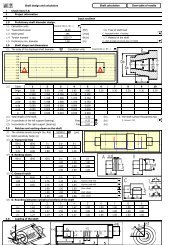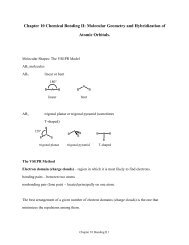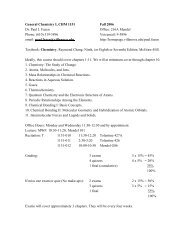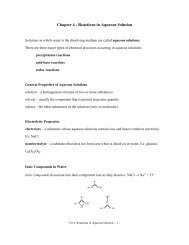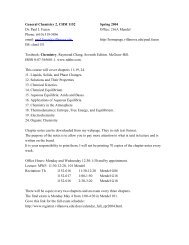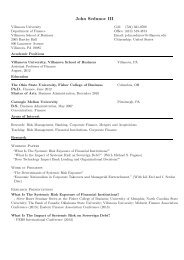A Culture of Collaborative Inquiry: Learning to Develop and Support ...
A Culture of Collaborative Inquiry: Learning to Develop and Support ...
A Culture of Collaborative Inquiry: Learning to Develop and Support ...
You also want an ePaper? Increase the reach of your titles
YUMPU automatically turns print PDFs into web optimized ePapers that Google loves.
teacher development, partnership, <strong>and</strong> group facilitation. Duringthe interviews, every facilita<strong>to</strong>r talked about inquiry <strong>and</strong> his or herparticipation in the project as a learning process in this largercontext. Here, John discusses the value <strong>of</strong> the inquiry process <strong>and</strong>the ongoing learning:We were able <strong>to</strong> develop a question <strong>and</strong> we had a resource that wasan excellent resource that we consulted <strong>and</strong> then did things wherewe brought in examples from the field <strong>to</strong> inform our question, <strong>and</strong>there was a real commitment <strong>to</strong> that. And I think we all felt like wewere experiencing that culture <strong>of</strong> inquiry <strong>and</strong> what it was reallylike <strong>to</strong> do inquiry in a group like that. . . . And just learning aboutgroup dynamics <strong>and</strong> facilitation <strong>and</strong> all that was a real eye-opener.First <strong>to</strong> learn about it intellectually <strong>and</strong> then <strong>to</strong> take cases <strong>and</strong>really dissect them, so, obviously we‘re still learning that, but it‘sgreat work.Striking parallels in regard <strong>to</strong> the value <strong>of</strong> inquiry <strong>and</strong> reflection onone‘s practice can be found in the above comments <strong>to</strong> those foundin past empirical studies on teacher inquiry (e.g., Little, 2003).Taking an inquiry stance implies a degree <strong>of</strong> deliberateness. AsDan stated throughout our inquiry, ―You have <strong>to</strong> go slow <strong>to</strong> g<strong>of</strong>ast.‖ Tom exp<strong>and</strong>ed on this idea: ―I think it‘s important <strong>to</strong>characterize our group as being very reflective <strong>and</strong> trying <strong>to</strong>improve how it does things, noticing its processes <strong>and</strong> products<strong>and</strong> trying <strong>to</strong> always get better.‖ In this sense, the organic nature <strong>of</strong>the evolution <strong>of</strong> our inquiry was driven by the care given <strong>to</strong> thework <strong>of</strong> the teachers by all members <strong>of</strong> the SC, <strong>and</strong> our ownindividual <strong>and</strong> collective goals <strong>of</strong> being intentional, data driven,<strong>and</strong> reflective in the work that we were accomplishing.Analysis <strong>of</strong> SC meeting notes <strong>and</strong> interviews reveals that eachgroup member talked about his or her own pr<strong>of</strong>essional learning inpositive ways, using phrases such as ―steep learning curve,‖ ―itwas like being shot out <strong>of</strong> a cannon!‖ <strong>and</strong> Dan‘s colorful statement,―Can I be excused because my brain is full?‖ Many explicitlyexpressed the sentiment <strong>of</strong> Lisa, who stated, ―This work hastransformed the way I think.‖ However expressive these commentsare, every member <strong>of</strong> the SC attributed his or her growth <strong>to</strong> theimpact <strong>of</strong> doing collaborative inquiry in a pr<strong>of</strong>essional learningcommunity. Ginny stated, ―This probably was the first real PLCI‘ve been a member <strong>of</strong>. I‘ve been facilitating PLCs but never reallygotten a chance <strong>to</strong> be a member <strong>of</strong> one, so just being able <strong>to</strong>experience the process I think is really valuable for my work as afacilita<strong>to</strong>r in PLCs.‖Similarly, Lisa stated, ―I‘m still learning, but I‘ve learned enough<strong>to</strong> be able <strong>to</strong> apply what I‘ve learned from this <strong>to</strong> the [other] grantthat I work with, ‗cause we‘re starting PLCs with that grant.‖ John,who as a district administra<strong>to</strong>r had a much different pr<strong>of</strong>essionalrole outside PRiSSM than Lisa or Ginny, focused explicitly onfostering collaboration in a group:I mainly learned, through that PLC work, about facilitation <strong>and</strong>about group dynamics <strong>and</strong> how <strong>to</strong> work with a group, <strong>and</strong> it‘s, youknow, there‘s something about that, it‘s actually now that I realizeit, because that was our area <strong>of</strong> study <strong>and</strong> so there‘s this sort <strong>of</strong>meta-level thing going on, you know? We were studying aboutbeing a group while we were being a group.Julie, the least experienced facilita<strong>to</strong>r, perhaps showed the mostdramatic growth:We don‘t always see [teachers] as pr<strong>of</strong>essionals, <strong>and</strong> I think that Ijust had the opportunity throughout the year <strong>to</strong> really just <strong>to</strong> thinkmore about that <strong>and</strong> how valuable <strong>and</strong> important that is, <strong>and</strong> thatevery teacher needs <strong>to</strong> be a part <strong>of</strong> something like that, a culture <strong>of</strong>just growth <strong>and</strong> learning. . . I would like <strong>to</strong> go in<strong>to</strong> educationalpolicy so that this type <strong>of</strong> thing happens regularly for all teachers,<strong>to</strong> go on <strong>to</strong> something that is not only supported by grants <strong>and</strong> that12 | P a g e




